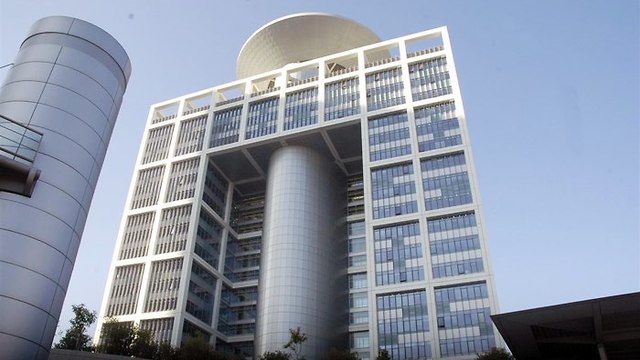
Kirya headquarters
צילום: דנה קופל
'Defense Ministry workers seriously undermining state security'
Ynet gains access to documents submitted to court by Defense Ministry calling for an immediate injunction against workers' union, which has led an internal strike amid a labor dispute arising from efforts to streamline managerial procedures; ‘The state’s security hangs in the balance.’
Employees at the Defense Ministry “failed to carry out an essential task in a manner that constituted a serious security breach and undermined state security,” the ministry recently complained to a Tel Aviv court after the workers' union refused to carry out mandatory tasks amid a labor dispute.
For eight months, the workers’ union in the Defense Ministry has been staging strikes over the expansion of the privatization of the ministry’s activities to an external company called Shavit in the wake of a 2015 government decision aimed at streamlining the ministry.
The workes' unions claims the decision does not produce any financial saving benefits due to the fact it involves the employment of dozens of expensive advisors and, moreover, harms essential activities of the Defense Ministry in which senior and experienced staff members work.
The complaint presented by the Defense Ministry to the court was based on the opinion drawn by the director of security of the defense establishment, Nir Ben-Moshe, in a confidential letter that was submitted to the court about a month ago and which has been seen by Ynet.
Following a request from Ynet, further details of the security-related ramifications caused by the strikes staged by the workers’union were released for publication, after the story first came to light three weeks ago.
While the majority of the details have not been cleared for publication, following an agreement that resulted from a request filed by Ynet, Deputy Chief Justice Hadass Yahalom at the Regional Labor Court in Tel Aviv approved the publication of a document that exposes the extent to which the workers' union has been able to leverage its position to achieve its goals.
Two months ago, as part of the internal strikes, the workers' union decided to stop performing periodic and critical tasks that are relevant to the IDF and the ministry’s security apparatus.
A gag order has been placed on the details of the exact nature of the activities that the workers ceased to perform. However, parts of the document submitted to the Labor Court by the Ministry of Defense, which demand an immediate injunction that would require the workers to return to carry out these vital activities, can be published.
Two weeks ago, after damage had already been caused by the refusal to carry out the tasks, the workers' union decided to stop its strikes, obviating the need for an injunction order against them. The extent of the damages caused to the defense establishment as a result, however, are difficult to measure.
“The ministry has been informed in recent days that the employees entrusted with carrying out vital activities are not carrying out their tasks in accordance with the instructions of the workers’ union in a manner which constitutes a severe breach of security,” read a document that was submitted to the court.
“Refraining from carrying out acts of a security nature such as these constitute a severe blow to state security,” the document went on to say.
“These are not legitimate strikes, since they concern the failure to carry out mandatory security directives in accordance with the law. This is similar to the rationale underlying the prohibition against strikes in security bodies such as the IDF and the Shin Bet,” it explained.
“The immediate significance of the strike in our case is a serious violation of state security. This is an unreasonable and disproportionate move which must be stopped immediately. The state’s security hangs in the balance,” the document continued.
“Since December 2017, the Defense Ministry has suffered widespread strikes by the workers, causing cumulative and significant damage, along with heavy economic harm, significant damage to the efficiency of the process of defense exports, supply management and the like,” it detailed.
According to the ministry, as soon as it realized that the workers were disobeying orders, Ben-Moshe immediately instructed them to stop and to resume work as usual, but his demands were ignored.
“It is inconceivable that workers should violate security directives, a matter that stands at the heart of security, in order to advance their organizational affairs,” a ministry official told the court. “Matters of security should not constitute a tool for a workers organization to use against management, especially since it harms national security.”
Representatives of the state even warned that the continuation of the strikes could cause irreversible damages to the state.
The workers’ union however claims that “Shavit harms the ministry’s workers in light of the employment of workers who are not part of collective agreements by outsourcing to subcontractors. The company has already recruited 35 employees at the cost of NIS 25 million, but it has yet to begin its work.”
The leader of the group, Shushan Peretz, who a week-and-a-half ago led a protest of hundreds of employees from the ministry outside the IDF Kirya headquarters in Tel Aviv, said that they could not sit idly by.
“We can’t remain indifferent to the critical blow to the public and to the professional and dedicated workers,” he said. “All the legal means are in our hands, and we will not let go until the struggle is decided upon in favor of the workers.”













